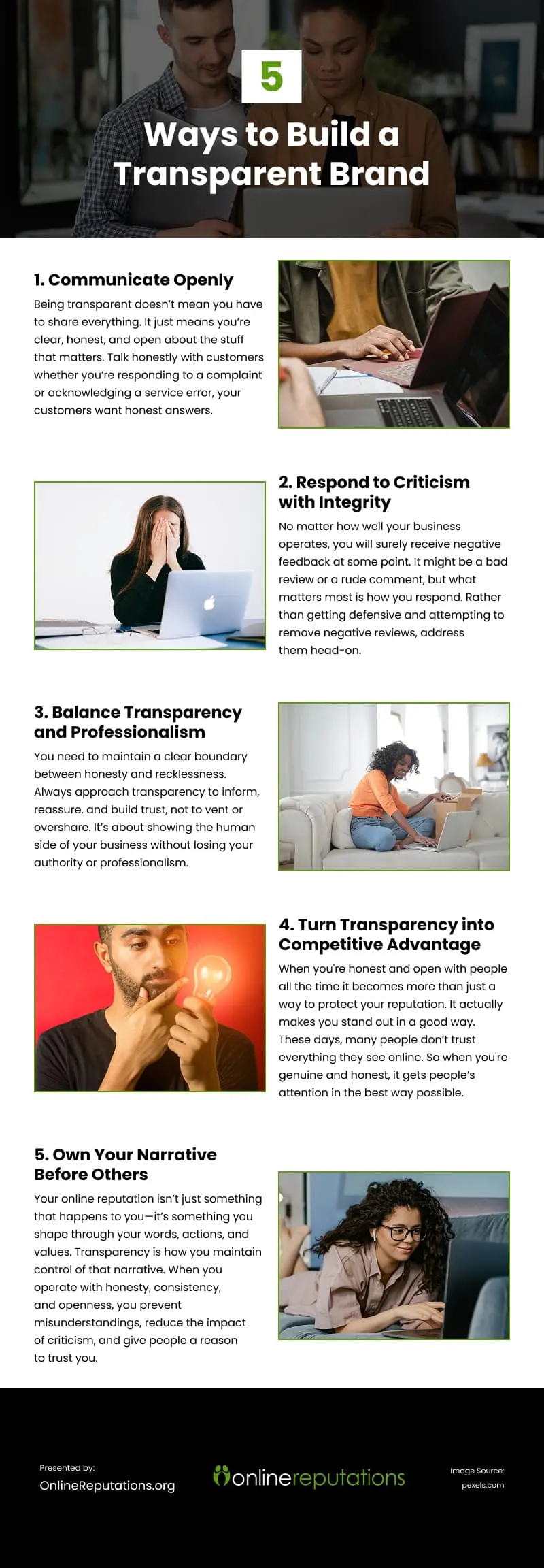How Transparency Builds Trust Online Build trust online by embracing transparency and creating a culture of openness. Click now to read about effective credibility strategies.
Want customers to trust you and your business online? Start with being genuine.
Building a good reputation doesn’t just happen—it takes time and consistency. People form opinions about you before you even talk to them, just by looking at what you post, how you respond to others, and what people say about you. Every review, comment, blog post, and social interaction contributes to your perceived credibility. So, if you want people to trust you (and your business), there’s one thing you absolutely must embrace: transparency.
Your digital footprint tells a story long before you speak to a customer. Transparency is not just about owning up when something goes wrong. It’s about creating a culture of openness that your customers, clients, and partners can see and trust. When you embrace transparency, you send a clear message: you have nothing to hide and are confident enough in your values and operations to be upfront.
When you lead with transparency, you no longer react to how the public sees you. Instead, you actively shape that narrative to align with who you are and what you offer.
5 Ways to Build a Transparent Brand
To effectively build a transparent brand, you need to make honesty and openness a habit, not just a response to conflict. Start by evaluating how you currently communicate with your audience. Are you open about your pricing and policies? Do you respond authentically to customer questions? Are you consistent in your messaging across platforms?
1. Communicate Openly
Being transparent doesn’t mean you have to share everything. It just means you’re clear, honest, and open about the stuff that matters. Here are a few ways to practice that:
- Talk Honestly With Customers—Whether you’re responding to a complaint or acknowledging a service error, your customers want honest answers. Don’t hide behind generic templates. Speak directly, take accountability, and offer solutions.
- Keep Your Posts Authentic—From your blog posts to social media captions, your content should reflect your brand’s personality and values. If there’s ever a mistake or update, address it openly and explain how it impacts your customers.
- Show Behind the Scenes—Share more than just your highlights. Giving your audience a peek into your processes, team culture, or decision-making builds stronger brand loyalty and trust.
The more you practice these strategies, the more people will trust you—not just because of what you say, but because of how consistently you show up.
2. Respond to Criticism with Integrity
No matter how well your business operates, you will surely receive negative feedback at some point. It might be a bad review or a rude comment, but what matters most is how you respond.
Rather than getting defensive and attempting to remove negative reviews, address them head-on. Thank the person for their feedback, explain what you’re doing to improve things, and follow through on those assurances. When others see you’re willing to admit mistakes and improve, they will respect you more.
For example, if someone posts a one-star review, reply kindly. Use their name, say you’re sorry they had a bad experience, and tell them how you plan to fix it. This not only helps that one person—it shows everyone else that you care and are willing to improve.
3. Balance Transparency and Professionalism
You might wonder if there’s such a thing as being too transparent. And the answer is yes, especially if your communication becomes overly casual, off-brand, or reveals sensitive information that could compromise trust. Transparency should never come at the expense of professionalism.
You need to maintain a clear boundary between honesty and recklessness. Always approach transparency to inform, reassure, and build trust, not to vent or overshare. It’s about showing the human side of your business without losing your authority or professionalism.
For instance, if you’re facing internal restructuring, it’s smart to share how that will affect your customers and your steps to maintain quality. But it’s not necessary to reveal internal disagreements or sensitive legal matters unless it’s essential. The key is to be informative and respectful, even when the situation is difficult.
4. Turn Transparency into Competitive Advantage
When you’re honest and open with people all the time—not just when something goes wrong—it becomes more than just a way to protect your reputation. It actually makes you stand out in a good way. These days, many people don’t trust everything they see online. So when you’re genuine and honest, it gets people’s attention in the best way possible. You don’t have to be perfect. You just have to be real.
Most people are tired of businesses that look perfect but don’t respond with integrity when things go wrong. They’d much rather support someone who tells the truth, takes responsibility, and isn’t afraid to say, “We made a mistake.” Being honest like that doesn’t make you weak—it actually makes people trust you more. And trust is super important if you want to grow and keep people coming back.
5. Own Your Narrative Before Others
Your online reputation isn’t just something that happens to you—it’s something you shape through your words, actions, and values. Transparency is how you maintain control of that narrative. When you operate with honesty, consistency, and openness, you prevent misunderstandings, reduce the impact of criticism, and give people a reason to trust you.
A lot of people think transparency only matters after something goes wrong. But the truth is, being open all the time helps prevent problems. When you share regular updates, talk about challenges, and let people see what’s happening behind the scenes, they’re more likely to trust you even if something doesn’t go perfectly.
In a digital world that rarely gives second chances, transparency is your best first impression. You don’t need to be perfect. But if you show up as honest, thoughtful, and accountable, your audience will take notice—and your reputation will reflect that.
Conclusion
So start now. Evaluate where you can be more open and strengthen your communication during challenging moments. If you’re not sure where to begin or want to get ahead of potential issues, consider teaming up with a reputation management agency to build a solid, proactive strategy. And remember, when your reputation is on the line, transparency isn’t a risk—it’s your strongest defense.
Infographic
Building a transparent brand goes beyond crisis management—it involves consistently demonstrating honesty, clarity, and openness across all interactions. Check out this infographic for practical insights and actionable tips on cultivating true transparency.






